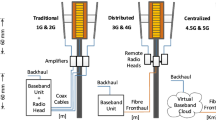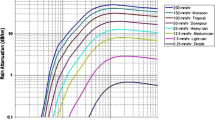Abstract
We study the optimal transmission strategy of a multiple-inputsingle-output wireless communication link. The receiver has perfectchannel state information while the transmitter hasonly long-term channel state information in terms of the channelcovariance matrix. It was recently shown that the optimal eigenvectors of the transmitcovariance matrix correspond with the eigenvalues of the channelcovariance matrix. However, the optimal eigenvalues are difficult tocompute. We study the properties of these optimal capacity achieving eigenvalues, and present a necessary and sufficient condition for theoptimal eigenvalues of the transmit covariance matrix. Furthermore, we develop a necessary and sufficient condition forachieving capacity when transmitting in all directions. We compare thecapacity gain of an optimal diversity system with a system which works with beamforming, and we derive an upperbound. We answer the main questions regarding the system design using the developed results. Additionally, we show inwhich way the multiplexing gain can be computed in case the channel covariancematrix is given. We compute the maximum number of required paralleldata streams, and we define a multiplexing function inorder to obtain a measure for the available multiplexinggain. Furthermore, we show that the capacity gain is small considering theadditional complexity at the receiver. We illustrate allresults by numerical simulations.
Similar content being viewed by others
References
H. Boche and M. Schubert, "A New Approach to Power Adjustment for Spatial Covariance Based Downlink Beamforming", in Proc. of ICASSP, Salt Lake City, Utah, 2001.
V. E. and U. Madhow, "Space-Time Transmit Precoding With Imperfect Feedback", IEEE Trans. on Information Theory, Vol. 47, No. 6, 2001.
D. Gerlach and A. Paulraj, "Adaptive Transmitting Antenna Methods for Multipath Environments", in Proc. IEEE Globecom'94, March 1994.
S. Jafar and A. Goldsmith, "On Optimality of Beamforming for Multiple Antenna Systems with Imperfect Feedback", in International Symposium on Information Theory (ISIT), 2001.
W. Jakes, Microwave Mobile Communication, IEEE Press: New York, 1974.
N.L. Johnson and S. Kotz, Continous Univariate Distributions – 1, Houghton Mifflin Series in Statistics, editorship H. Chernoff, 1970.
A. Kolmogorov and S. Fomin, Introductory Real Analysis, Dover Publications, Inc.: New York, 1970.
A. Narula, M. Lopez, M. Trott and G. Wornell, "Efficient Use of Side Information in Multiple-Antenna Data Transmission over Fading Channels", IEEE Journal on Selected Areas in Communications, Vol. 16, No. 8, 1998.
M. Schubert and H. Boche, "Solvability of Coupled Downlink Beamforming Problems", in Proc. IEEE Globecom Conference, San Antonio, Texas, 2001.
Author information
Authors and Affiliations
Rights and permissions
About this article
Cite this article
Jorswieck, E., Boche, H. Optimal Transmission with Imperfect Channel State Information at the Transmit Antenna Array. Wireless Personal Communications 27, 33–56 (2003). https://doi.org/10.1023/A:1026048118953
Issue Date:
DOI: https://doi.org/10.1023/A:1026048118953




